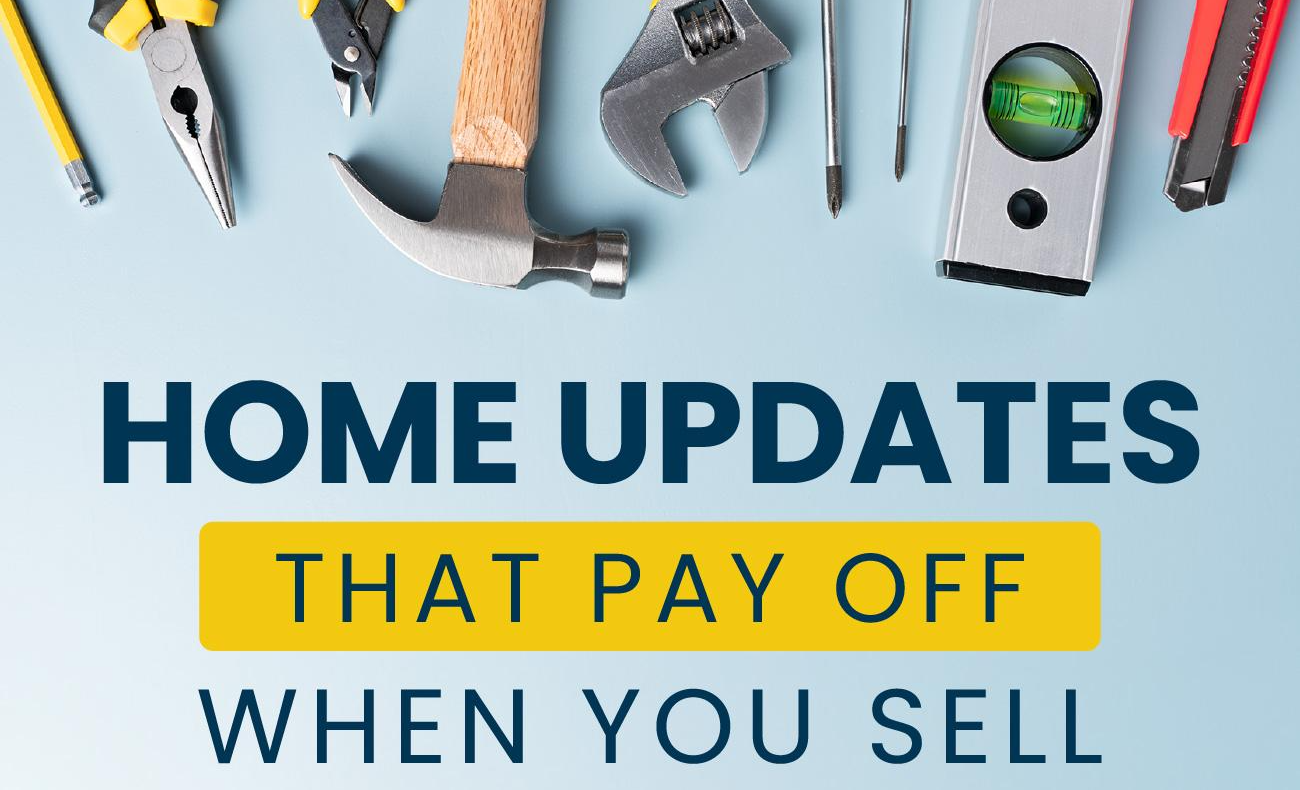
Team Fosgate
Trusted News From The Experts
Understanding Home Sales and Taxes: Do You Need to Report Yours?
Selling your home? You may exclude up to $250K ($500K for married couples) from taxes if you meet the residency rule. If you receive Form 1099-S, you must report the sale, even if no tax is owed. No form? Reporting is optional but can help avoid IRS scrutiny. If required, use IRS Form 8949 and Schedule D. Unsure? Consult a tax pro to ensure compliance.
Is It Better To Rent or Buy a Home Today?
A study shows that 70% of prospective buyers fear the long-term consequences of renting. And here’s why. Rent usually rises over time and that can make it harder to save up to buy a home. But when you buy, you can stabilize your housing expenses and grow your net worth as home values rise. While renting may be the less expensive option in some markets, it can’t match the long-term benefits of homeownership. What’s your #1 reason for wanting to buy?
Do You Know How Much Your Home Is Worth?
With national home values soaring by nearly 60% in five years, understanding your home's worth is crucial. Learn how market trends and expert insights offer a precise home valuation, empowering informed selling decisions in a booming market.
Is an Accessory Dwelling Unit Right for You? Here’s What To Know
Are you having a hard time finding the right home in your budget? Or maybe you already own a home but could use some extra income or a designated space for aging loved ones. Either way, accessory dwelling units (ADUs) could be the smart solution you’ve been looking for in today’s market.
Are Investors Actually Buying Up All the Homes?
It's a common belief that large institutional investors are dominating the home buying market, but data shows this isn't the case. Most real estate investors are small-scale, owning just a few properties. Additionally, institutional investor purchases have significantly declined; they constituted only 0.3% of home sales by Q3 2024, down from 2.4% at their peak in Q2 2022. This reduction is mainly due to less favorable market conditions like higher mortgage rates and home prices. Understanding that big investors are less active could reassure potential homebuyers about their chances in the current market.
How To Buy a Home Without Waiting for Lower Rates
Mortgage rates are expected to stay around 6.5-7%. Don't wait for a significant drop; consider alternatives:
Mortgage Buydowns - Pay upfront to lower rates temporarily, popular with first-timers.
Adjustable-Rate Mortgages (ARMs) - Start with lower rates; safer post-2008 with better borrower qualifications.
Assumable Mortgages - Take over the seller's lower rate loan; over 11 million homes qualify.
Discuss these with a lender to find what suits you. How does this influence your homebuying plans?
Should I Update My House Before I Sell It?
With more homes for sale and buyers being more selective, it’s smart to make strategic updates. But how do you decide what’s worth doing? You lean on an agent. An agent will be able to tell you what buyers want, quick wins that’ll have a big impact, and what projects have the best ROI. What projects are on your to-do list before selling? With only a month left before spring, let’s connect so you know what’s worth the time and effort.
Seller Concessions: A Smart Strategy To Get Your House Sold
With market balance, concessions like covering closing costs, price adjustments, or home warranties are increasing, with 24% of sellers in 2024 offering them. These reduce profit at closing, not additional costs, and might include leaving items. They facilitate deals by addressing buyer issues. An agent's guidance is key for negotiation. What concession would you consider?
The Return to Urban Living — Why More People Are Moving Back to Cities
Urban living is on the rise with 16% of people moving to cities, the highest in a decade. Key reasons include: 1) Vibrant Culture - cities offer cultural hubs with endless activities. 2) Proximity to Work - hybrid work models make commuting easier. 3) Convenience - easy access to transport, healthcare, etc. If you own a suburban home, selling it can provide equity for a city move, despite smaller spaces. What's your favorite city aspect? Let's find you an urban home.
Buying a Home May Help Shield You from Inflation
Buying a home can serve as a defense against inflation because a fixed-rate mortgage keeps your housing costs stable, unlike rent which typically increases faster than inflation. Additionally, home values generally appreciate at a rate above inflation, boosting your wealth. This stability in payments and potential appreciation make homeownership a strategic move during inflationary times, offering both budget predictability and long-term financial growth.
Are You Asking Yourself These Questions About Selling Your House?
Common concerns for sellers include timing, finding a suitable new home, and buyer interest. Home values are up, providing funds for moving despite rates. Inventory has increased by 25%, improving options. Despite conditions, 4.24 million homes sold last year, showing ongoing demand. Discuss with an agent for clarity on your move. What's your biggest concern?
Why You’ll Love Owning a Home
Owning a home comes with many benefits, both non-financial and financial. From the sense of accomplishment and freedom of expression, to growing your net worth, it’s easy to fall in love with homeownership. What’s the top reason you’d love to own a home? Let me know and we’ll come up with a plan that makes it possible.
The Secret To Selling This Spring: Start the Prep Work Now
Spring is prime time for selling homes due to high buyer activity. Start prepping now, about a month before spring, as the market has more listings, and buyers are choosy. Common projects include replacing water heaters, HVAC, and flooring, focusing on energy efficiency. Prioritize repairs wisely; focus on high ROI projects like roofing or flooring. Consult with a local real estate agent to ensure you're making cost-effective upgrades that appeal to buyers. Let's connect to prioritize your to-do list for the best outcome.
Breaking Into the Market: Smart Moves for First-Time Buyers
Consider your first home as a stepping stone to build equity, not your forever home. Expand your search to find affordable options by looking in surrounding areas or states. A real estate agent can help find cost-effective local options or hidden gems in nearby communities, allowing you to start building equity and setting up for future moves.
A Record Percent of Buyers Are Planning To Move in 2025 – Are You?
According to a NerdWallet survey, a record 15% of people plan to buy a home this year, up from 9-11% since 2020, indicating pent-up demand. While not a flood, this suggests increased market activity. Many buyers have started their search online, likely peaking this spring. With the right preparation, pricing, and marketing, your house can be prominently featured to these buyers.
What do you think these buyers will love most about your house? Let’s talk it over and make sure it’s front and center in your listing.
Home Price Growth Is Moderating – Here’s Why That’s Good for You
The rapid increase in home prices over recent years has slowed to a more moderate pace, with a national year-over-year increase of just 3.8% in November. This normalization allows for a more predictable buying environment, reducing the shock of price jumps and making ownership more reachable. Prices vary by location; some areas in the Midwest see demand, while others are cooling. Understanding your local market with a real estate agent is key. This steady growth still promises future equity increases.
Why Buying a Home Now Is Your Winning Play
You may be sitting on the sidelines wondering if it’s better to buy now or wait. But buying before the spring rush may be a game-changing decision. Moving this winter can give you significant advantages, like less competition, more negotiating power, and lower prices. If you’re able to buy now, stay ahead of the game and outrun the competition. To tackle your homebuying plans this year, let’s connect.
The Perks of Buying a Fixer-Upper
Buying a fixer-upper can be a smart move for homeownership in today's market due to lower upfront costs, less buyer competition, and the potential to quickly build equity. These homes require renovations ranging from cosmetic to structural. Before committing, consider your renovation gameplan, prioritize repairs, evaluate location, get a home inspection, budget for unexpected costs, and explore financing options. This approach can turn an imperfect house into your perfect home.
The 3 Biggest Mistakes Sellers Are Making Right Now
Sellers are currently making three critical errors: overpricing their homes, neglecting necessary repairs, and being inflexible in negotiations. Overpricing deters cautious buyers, leading to price reductions. Skipping repairs can signal larger issues to buyers, lowering offers. Refusing to negotiate can lose sales due to the competitive market. An expert real estate agent can prevent these pitfalls by providing market insights, advising on repairs, and facilitating negotiations, making not using an agent the biggest mistake of all.
Buyer Bright Spot: There Are More Homes on the Market
Home inventory has increased significantly, with existing home listings up by 22% and further growth expected. One in three homes on the market is newly built, often at more affordable prices. This surge in available homes, both existing and new, provides buyers with more options, enhancing the likelihood of finding the right home within budget.




















